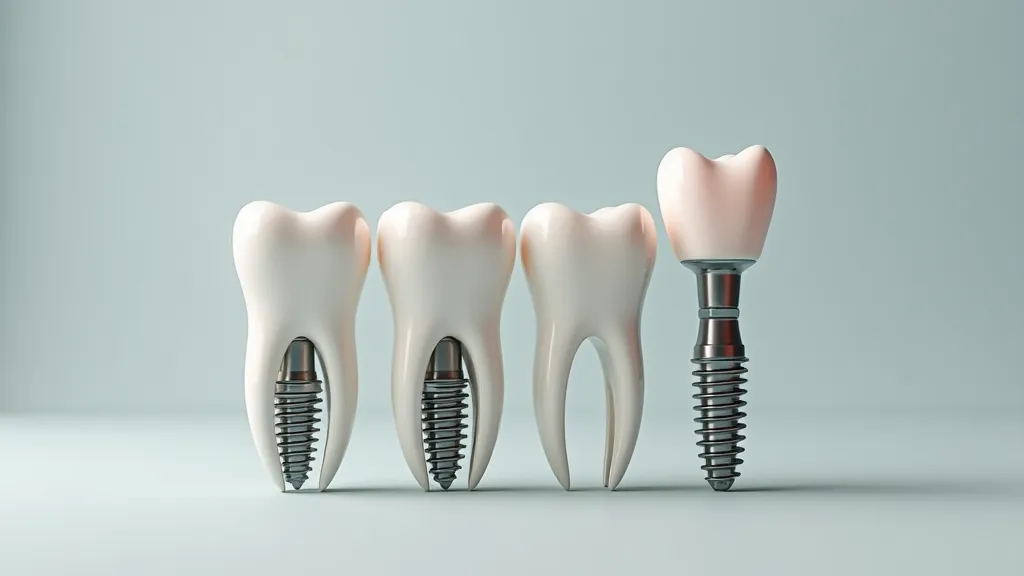Discover everything about dental implants, including benefits, procedures, and maintenance tips for a beautiful smile.

Dental implants are artificial tooth roots made of titanium, designed to provide a good base for fixed or removable replacement teeth. They are an ideal solution for individuals who have lost a tooth or teeth due to injury, periodontal disease, or other reasons. Unlike traditional dentures and bridges, dental implants are anchored directly into the jawbone, which allows them to function like natural teeth.
Over the years, advancements in dental technology and techniques have made implants more accessible and more successful than ever before. With a high success rate and the ability to restore functionality and aesthetics, dental implants have become a popular choice for tooth replacement.
Dental implants offer numerous advantages over traditional dentures or bridges:
Premise: Before undergoing dental implant surgery, it is crucial to consult a qualified dental professional with experience in implant dentistry.
Recommendation: Schedule a comprehensive evaluation, including X-rays and a thorough oral examination, to assess your candidacy for implants. During this consultation, your dentist will discuss your medical history, oral health, and any potential risks associated with the procedure.
Expected Outcome: A personalized treatment plan will be created, ensuring a successful implant procedure tailored to your needs. This plan may include preliminary treatments such as bone grafting if you do not have enough bone density to support an implant.
The dental implant process generally involves several key steps:
Premise: After receiving dental implants, proper care is essential for healing and longevity. The immediate post-operative period is critical for ensuring a successful outcome.
Recommendation: Follow your dentist's post-operative instructions carefully, which may include avoiding hard foods, maintaining oral hygiene, and attending follow-up appointments. It’s also essential to manage any discomfort with prescribed medications and to monitor the surgical site for signs of infection.
Expected Outcome: Adhering to these guidelines will promote healing and ensure the success of your dental implants. Many patients report a return to normal activities within a few days after the procedure, although full healing can take several months.
To ensure the longevity of your dental implants, consider the following:
Premise: Understanding the financial aspect of dental implants is crucial for informed decision-making. The cost can vary widely based on several factors, including the complexity of the case and the materials used.
Recommendation: Consult with your dental provider about the costs involved, including the procedure, materials, and follow-up care. Some dental offices may offer payment plans or financing options to help manage costs. Additionally, check with your dental insurance provider to see if any part of the procedure is covered.
Expected Outcome: Having a clear understanding of costs will help you budget effectively and make the best choice for your dental health. It's important to remember that while the initial cost may be higher than other options, the long-term benefits of dental implants often outweigh the expense.
With proper care, dental implants can last a lifetime, making them a worthwhile investment. Regular maintenance, including good oral hygiene and routine dental visits, is key to their longevity.
While some discomfort is expected, many patients report that the pain is manageable and subsides quickly. Local anesthesia and sedation options are available to ensure your comfort during the procedure.
The process can take several months, as it includes healing time between stages. Your dentist can provide a more accurate timeline based on your specific situation, including any pre-implant procedures like bone grafting.
Most individuals who are in good health and have sufficient bone density are candidates for dental implants. However, certain medical conditions or lifestyle factors may affect candidacy, so a consultation with a dental professional is necessary.
As with any surgical procedure, there are risks involved, including infection and implant failure. However, these risks can be minimized with proper care and regular check-ups. Your dentist will discuss any potential risks during your consultation.
Not replacing a missing tooth can lead to several complications, including shifting of adjacent teeth, bone loss in the jaw, and difficulty chewing or speaking. Over time, this can lead to further tooth loss and other dental issues.
Patients with active gum disease may need to have it treated and controlled before they can be considered for dental implants. Your dentist will evaluate your gum health and recommend the best course of action.
Dental implants are a highly effective solution for tooth loss, offering both functionality and aesthetic appeal. They can significantly improve your quality of life by restoring your ability to eat, speak, and smile with confidence. By following the advice outlined in this guide, you can achieve a successful outcome and maintain your dental implants for years to come. Remember to consult with your dental professional for personalized care and support throughout your implant journey.
Incorporating these keywords and structured information will not only help with SEO but also provide valuable insights to readers seeking information on dental implants. The importance of ongoing education about dental care cannot be overstated, as it empowers individuals to make informed decisions about their oral health. As dental technology continues to evolve, staying updated on the latest advancements in implant dentistry can further enhance your understanding and choices.
Finally, dental implants are not just about aesthetics; they contribute to overall oral health, ensuring that your mouth functions correctly and that you maintain a healthy, confident smile for years to come. By investing in dental implants, you are not only restoring teeth but also preserving the integrity of your jawbone, facial structure, and oral health.
In conclusion, whether you are considering dental implants for yourself or a loved one, it’s essential to approach the process with careful thought and professional guidance. With the right support and information, dental implants can be a life-changing solution for those experiencing tooth loss.